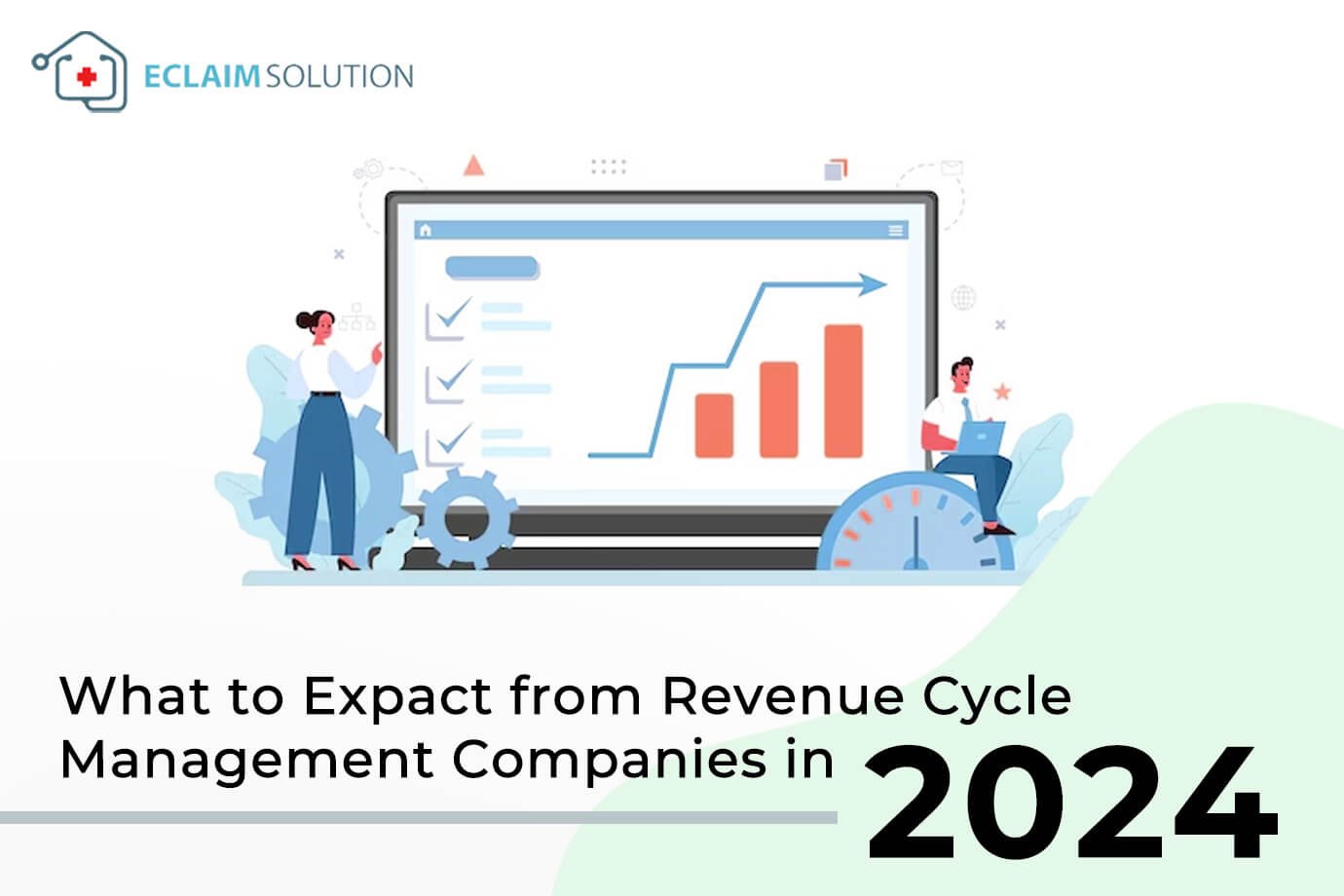
2024 Anticipated Trends in Revenue Cycle Management (RCM) by eClaim Solution LLC – A Leading US-Based Medical Billing Company
As we step into 2024, the healthcare industry remains at the forefront of technological evolution, reshaping both patient care and the operational facets of medical practices. Within this landscape, Revenue Cycle Management (RCM) emerges as a crucial focus area, considering the burgeoning global market and the transformative potential of AI in healthcare.
The Expanding RCM Market: In 2023, the RCM market reached a valuation of USD 121.8 billion, poised for a projected Compound Annual Growth Rate (CAGR) of 12.2% from 2024 to 2032, with an estimated market value of USD 342.6 billion by 2032. These figures underscore the significance of revenue cycle management companies in today’s evolving healthcare landscape.
AI-Driven RCM Transformation: In the coming year, AI is expected to play a pivotal role in managing denials. By identifying patterns in denied claims, AI will enable healthcare providers to develop effective appeal strategies, optimizing the denial management process. Additionally, AI will revolutionize payment posting by automating processes, enhancing accuracy, and reducing staff workload. The integration of tools like chatbots will further improve patient interaction and understanding regarding bills and payments.
Cloud-Based RCM Solutions: The adoption of cloud-based RCM solutions is on the rise due to their scalability, accessibility, and robust security features. These solutions cater to healthcare organizations of varying sizes, accommodating rapid growth or seasonal fluctuations in claim volumes.
Interoperability in RCM: Interoperability, ensuring seamless data exchange with insurers and stakeholders, is vital for RCM efficiency, minimizing errors in the process.
The Role of Data Analytics: Data analytics plays a critical role in RCM by identifying trends, patterns, and outliers, enhancing efficiency and effectiveness. This tool helps in pinpointing common reasons for denials and in developing strategies to mitigate them.

Cybersecurity and Data Protection: In 2024, paramount importance is placed on cybersecurity and data protection in RCM systems. Healthcare organizations are expected to invest heavily in advanced cybersecurity technologies to safeguard patient data against ever-evolving cyber threats.
Implementing Key RCM Strategies:
- Automated Prior Authorization Workflows: Reducing errors and boosting efficiency.
- Improved Patient Access: Leveraging technological solutions like telemedicine and self-check-ins to enhance patient satisfaction.
- Reduced Denials and Revenue Loss: Utilizing AI and data analytics to identify root causes and prevent denials.
- Strengthened Appeals Processes: A focus on refining the appeals process to reclaim lost revenue.
Preparing for 2024 RCM Trends: Healthcare providers must prepare for emerging trends by investing in AI-powered and cloud-based RCM solutions. Ensuring interoperability and investing in data analytics will be crucial for success in 2024.
The Benefits of AI in Healthcare RCM: AI integration in RCM promises streamlined processes and predictive insights, enhancing decision-making. The manifold benefits include enhanced accuracy in medical billing, efficient claims processing, and improved patient data management. The evolution of AI, especially in generative AI healthcare and AI medical billing, is expected to bring about a paradigm shift in managing and optimizing healthcare revenue.
Advancements in Generative AI Healthcare: Generative AI healthcare is gaining momentum, holding the potential for groundbreaking developments in patient care and RCM processes. It can predict patient payment behaviors, optimize billing cycles, and assist in developing personalized patient engagement strategies.
AI for Healthcare – Beyond Billing: While AI’s role in medical billing is significant, its applications in healthcare extend beyond financial transactions. AI in healthcare encompasses patient diagnosis support, treatment planning, and managing patient records. This integration complements RCM functions, ensuring a holistic approach to patient care and management.
Optimizing Patient Scheduling and Insurance Eligibility: In 2024, RCM companies will leverage AI to optimize patient scheduling and ensure insurance eligibility, resulting in a smoother patient experience and more efficient billing cycles. Automated scheduling systems and real-time insurance eligibility checks will minimize delays and reduce claim rejections due to eligibility issues.
Emerging Solutions for Revenue Loss and Denial Management: Addressing revenue loss and denial management challenges in 2024 involves employing advanced data analytics and AI-driven tools. Proactive identification of patterns and root causes of denials will reduce revenue leakage, improving the financial health of healthcare organizations.
The Importance of Patient-Centric RCM: In 2024, a patient-centric approach involves offering multiple payment options, transparent billing practices, and improved patient communication. Enhancing the patient’s financial experience is critical for retaining patients and maintaining a positive reputation.
Conclusion: As we approach 2024, eClaim Solution LLC and other RCM companies are poised to play a pivotal role in transforming the healthcare industry. With the integration of AI, cloud-based solutions, and a focus on interoperability and data analytics, these companies are well-equipped to handle the complexities of modern healthcare finance. The potential for improved patient outcomes and operational efficiencies in healthcare is immense as we embrace these trends.
Discover Top-Notch Medical Billing Services in New York, Texas, Pennsylvania, and Florida! For inquiries or assistance with Medicare revalidation, trust eClaim Solution USA. Contact us at +1 (844) 348-6296 for expert support.


No Comments